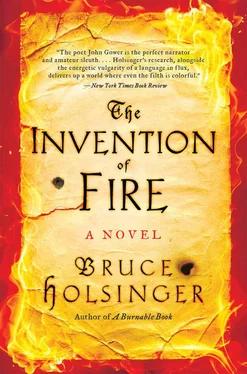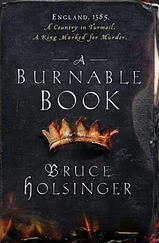Bruce Holsinger - The Invention of Fire
Здесь есть возможность читать онлайн «Bruce Holsinger - The Invention of Fire» — ознакомительный отрывок электронной книги совершенно бесплатно, а после прочтения отрывка купить полную версию. В некоторых случаях можно слушать аудио, скачать через торрент в формате fb2 и присутствует краткое содержание. Год выпуска: 2015, Издательство: HarperCollins, Жанр: Исторический детектив, на английском языке. Описание произведения, (предисловие) а так же отзывы посетителей доступны на портале библиотеки ЛибКат.
- Название:The Invention of Fire
- Автор:
- Издательство:HarperCollins
- Жанр:
- Год:2015
- ISBN:нет данных
- Рейтинг книги:3 / 5. Голосов: 1
-
Избранное:Добавить в избранное
- Отзывы:
-
Ваша оценка:
- 60
- 1
- 2
- 3
- 4
- 5
The Invention of Fire: краткое содержание, описание и аннотация
Предлагаем к чтению аннотацию, описание, краткое содержание или предисловие (зависит от того, что написал сам автор книги «The Invention of Fire»). Если вы не нашли необходимую информацию о книге — напишите в комментариях, мы постараемся отыскать её.
The Invention of Fire — читать онлайн ознакомительный отрывок
Ниже представлен текст книги, разбитый по страницам. Система сохранения места последней прочитанной страницы, позволяет с удобством читать онлайн бесплатно книгу «The Invention of Fire», без необходимости каждый раз заново искать на чём Вы остановились. Поставьте закладку, и сможете в любой момент перейти на страницу, на которой закончили чтение.
Интервал:
Закладка:
“Lancaster?”
“Gloucester. Snell was a man-at-arms in the duke’s household, and he’s been the king’s armorer for going on nine years now.” Thomas of Woodstock, Duke of Gloucester, was the youngest of the king’s uncles, and one of the most powerful of the lords in the rival faction.
Further questions elicited from Rune and the earl that William Snell was at present charged with the building out and improvement of the king’s artillery. “Assembling as many guns as he can down there, more guns than the king’s armory has seen in all its history,” said Rune. “And not only assembling, but improving, enhancing, inventing, searching for the newest techniques and devices from Burgundy and Milan, the best men to rival their makers. He is also amassing gunpowder sufficient for a year’s siege and a great battle to follow. Why, last week I was given a bill for a quantity of saltpetre so immense that I sent my clerk back to the Exchequer twice in an hour simply to check the numbers.”
“And he is doing all of this with King Richard’s approval?” I asked.
The chancellor grimaced. “Certainly not with mine, nor, from what I understand, with Lancaster’s.” John of Gaunt, Duke of Lancaster and in those years the most powerful force in the realm next to King Richard himself. The king’s uncle was abroad in Spain that fall, running a small and ragged kingdom from his base in Ourense, a venture supported by several thousand English and Portuguese troops bought or pressed into a sizable army. The massive company had sailed from Plymouth two months before, leaving a void in the domestic defenses even as the French were massing at Sluys. I had heard no good explanations as to how Gaunt persuaded the king to approve the Castilian venture at such a delicate moment, though the damage was already done.
“Lancaster’s absence seems to have knocked loose a nail or two,” said the earl. “Snell has convinced himself that his artillery is the most important work in the realm. That London, even England, will stand or fall on the power of these new guns. The man’s self-regard knows no limit, it seems.”
“Vainglory is the truest engine of our souls, my lord,” I said.
“Yes.” His eyes settled on me. “You know, Gower, you would find the Tower a fitting subject for one of your poetical fancies. It sits there like a great maw between the river and the walls, swallowing iron, copper, wood, powder, chewing all of it to a paste, then spitting out these strange and barbarous machines, pointing them at the future.”
“Not an overly indebted future, I hope.”
“A new subsidy is inevitable, I’m afraid,” said the chancellor with a heavy sigh. “More taxes, more discontent, more force from above.”
“And more rebellion?”
He blinked. “If not from the Commons, then from the Lords, I fear.”
He looked at Rune, who nodded my way, signaling the end of our appointment. I rose. The earl’s face sagged as he received my bow, then he looked aside, and I left his chambers sour-stomached and perturbed.
Rune walked with me to the great hall. We stood at the end of the passage. A droning bailiff descanted from Common Pleas.
I was about to take my leave of the chancellor’s secretary when Rune grasped my elbow, closed in. “Snell has isolated himself down there, Gower,” he said, his breath slightly foul on my cheek. “This is more than bureaucratic arrogance. The man thinks himself a kind of god, running the armory like some new Olympus. And he never comes out. Nor does he respond to letters, and our messengers have been beaten, thrashed, threatened with knives and swords. All we get up here are bills and rumors.”
“The Tower is less than three miles from where we stand,” I pointed out. “Surely his lordship the earl or any other of the higher lords could take a company down there with orders from King Richard and simply turn the man out.”
“Surely, you say,” he responded with a note of disdain. “You cannot think we haven’t considered it, plotted it, mapped it all out? The truth is everyone is so terrified of the man, no one wants to confront him-not with Gaunt and our most tactical military men out of the country, and France massing for an invasion. Snell has himself and his guns and his men bulwarked all along the northern walls, practically daring us to come in and uproot him. A dragon sitting on his hoard. The castle that is supposed to be guarding our city has instead become its greatest vulnerability.”
“So what do you suggest, Rune?” I said, hiding my surprise at this show of royal weakness. “Should we commission an actual dragon or two to fire the place? Or hire a mercenary army from Italy, perhaps Hawkwood and his company?”
He turned his face to me. It was stony, free of passion. “Jest if you wish, Gower. But there is more at risk here than you can possibly know. We need every ally we can maintain to help keep the Tower in line. And on the subject of allies, what of Brembre?”
I answered him cautiously. “The mayor is showing some reluctance to pursue the Walbrook murders.” I watched Rune’s eyes. They narrowed at the edges.
“That is disturbing news, Gower. Shall I confront him myself?”
Rune could sense my hesitation. Though the chancellor and the mayor were both in the king’s faction, they had very different interests at stake, and I hardly wished to unsettle relations between the two powerful men. Never stir waters that need no stirring, as my father liked to say. “Nicholas Brembre is no weak-kneed baron, eager to protect an unspotted reputation,” I said. “Give me time to lift a few leaves, Rune. If I need another hand pushing on this I will let you and the earl know.”
“Good then,” he said, looking somewhat mollified. Rune palmed my elbow and shared one last thought. “You will be doing the lord chancellor a fair favor if you can find a way to rattle Snell. Pull him from his moorings down there, put things right. Discover who committed this atrocity, Gower, and the extent of Snell’s involvement. It would be a great help at Parliament time should things up here grow . . . dangerous.”
So there it was. With one finger in a hornet’s nest I was about to shove in an arm, and damn the thousand stings.
Chapter 8
Stephen Marsh peered down at the swirled width of mud far below, the very bottom of the wide ditch separating the Iron Gate from the old Well Tower, which stood as the first-built sentry to the great complex sprawling to the north and west of him. At Stephen’s insistence his entry to the Tower late that afternoon would be from the east rather than from the heavily trafficked entrance off Tower Street, always crowded with Londoners seeking alms, favor, and news. One of Snell’s men, after meeting him at the stairs below St. Katharine’s wharf, had led him up and over this, the narrowest of passages, to the curtain wall, where he now stood alone, waiting for his audience with the king’s armorer. It was a glorious day, crisp and clear, and as he smelled the autumn air his gaze wandered toward the river. At the far end of the ditch, where the moat fosses met the Thames, a brave clutch of morning bathers sprawled on the wide quay, daring the guard to descend and try to take them. Beyond the swimmers two royal balingers stood out on the river, flashing colorful banners from yardarms and mastheads.
“This way.”
Two new guards, one beckoning for him to follow. They walked north, away from the river, over the walls and through several towers. The whole perimeter bristled with men and spears. The sentryway then took them east before their descent through the Bowyer Tower just down from St. Peter ad Vincula, the parish church that lay within the Tower grounds. The guards led him to that end of the wide yard, currently occupied with a hobelar company. Yorkshiremen, judging from the banner held by one of the front-most riders, and though Stephen had always appreciated the vastness of the Tower, he was surprised to see such a quantity of horses at work among the towers and walls.
Читать дальшеИнтервал:
Закладка:
Похожие книги на «The Invention of Fire»
Представляем Вашему вниманию похожие книги на «The Invention of Fire» списком для выбора. Мы отобрали схожую по названию и смыслу литературу в надежде предоставить читателям больше вариантов отыскать новые, интересные, ещё непрочитанные произведения.
Обсуждение, отзывы о книге «The Invention of Fire» и просто собственные мнения читателей. Оставьте ваши комментарии, напишите, что Вы думаете о произведении, его смысле или главных героях. Укажите что конкретно понравилось, а что нет, и почему Вы так считаете.












